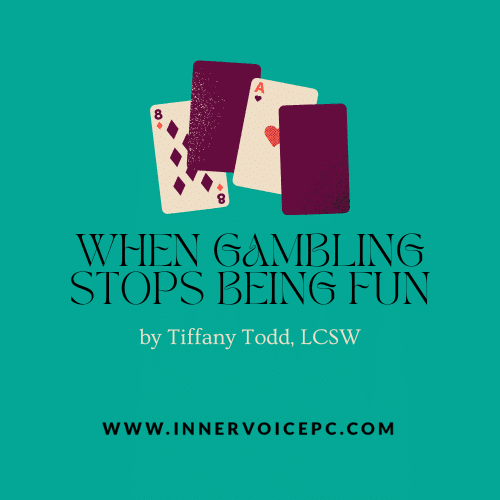
When Gambling Stops Being Fun: Recognizing the Signs and Seeking Support
More Than Just a Game
For many, gambling is a harmless thrill—a way to add excitement to a night out, a friendly bet on a game, a quick scratch-off ticket for fun. It’s easy to see it as just another form of entertainment. But sometimes, what starts as a lighthearted activity begins to carry more weight. The stakes start to feel higher, not just financially but emotionally. The line between fun and something more complicated isn’t always clear at first. It might begin with the occasional urge to chase a loss or the quiet frustration of spending more than intended. Maybe there’s a growing need to keep gambling a secret, or a restless energy that builds when trying to stop.
Gambling becomes a concern when it stops feeling like a choice. When there’s a pull to keep going, even when the cost—emotional, relational, or financial—keeps rising. It’s not just about losing money; it’s about the moments of regret, the stress, the way it begins to shape daily thoughts and decisions. Recognizing these shifts isn’t about shame. It’s about understanding when gambling moves from a casual activity into something that takes up too much space in life.
Why Gambling Can Be Hard to Walk Away From
The excitement of gambling isn’t just about the possibility of winning. It’s about the rush, the anticipation, the way time seems to disappear in the moment. The brain releases dopamine, the same chemical linked to pleasure and reward, reinforcing the cycle. Even near-misses can create a surge of adrenaline, making it feel like a win is just around the corner. When losses happen, the mind wants to fix them, convincing itself that one more bet, one more spin, one more round will bring everything back into balance.
This pattern can make gambling difficult to step away from, especially when it’s become a way to cope with stress, loneliness, or difficult emotions. The highs and lows mirror the emotional rollercoaster of hope and disappointment, making it easy to lose track of how much is being spent—not just in money, but in energy, focus, and well-being.
The Emotional and Real-World Impact
At first, the signs can be subtle. A missed bill or a little more secrecy about gambling habits. A sense of unease after betting more than planned, followed by promises to cut back that never quite stick. Over time, the effects become harder to ignore. Stress begins to creep in, creating tension in relationships or moments of anxiety when looking at bank statements. There may be irritability when not gambling, or a restless feeling that lingers until the next bet. The cycle continues, fueled by the belief that the next big win will make it all better.
For some, these moments bring shame, making it harder to talk about what’s happening. Gambling can feel isolating, especially when there’s a fear of judgment from others. But struggling with gambling isn’t a reflection of personal failure—it’s a response to a powerful cycle that many people experience. The brain is wired to seek rewards, and gambling taps into that deeply. Recognizing the patterns is the first step in shifting them.
Taking Steps Toward Change
Change doesn’t have to happen all at once. Even small shifts—setting limits, talking to someone, exploring new ways to cope with stress—can begin to loosen the grip of gambling. The first step is simply noticing. Noticing the thoughts, the urges, the emotions that surface before and after gambling. Noticing how the body reacts, the tension, the anticipation, the relief, and what follows.
If gambling is beginning to take more than it gives, support is available. The National Problem Gambling Helpline (1-800-522-4700) offers confidential, 24/7 support for those seeking guidance. Resources like www.ncpgambling.org provide tools and local connections for those ready to explore next steps.
Gambling doesn’t have to be all or nothing. It’s possible to redefine the relationship with it, to step back and choose a different path. With awareness, support, and small, intentional changes, it’s possible to regain control—not just over gambling, but over the sense of agency and well-being that comes with it.
How Therapy Can Help
Therapy offers a space to explore gambling without judgment, to understand the emotions and experiences that may be fueling it, and to create a path forward with support. Many people who struggle with gambling also struggle with the shame that comes with it. They ask themselves why they couldn’t stop sooner or why they kept chasing losses. A therapist helps reframe those thoughts, shifting from self-blame to self-understanding. Gambling isn’t just about the behavior—it’s about what’s underneath it.
A therapist can help uncover the patterns that make gambling feel necessary, whether it’s stress, emotional numbness, or a deep need for excitement. They can help rebuild financial and emotional boundaries, strengthen self-trust, and develop new ways to manage urges without judgment. Therapy is also a space to work through the losses—whether financial, relational, or emotional—and begin rebuilding a sense of control.
Gambling can take hold quietly, but it doesn’t have to stay that way. With support, self-compassion, and small steps toward change, it’s possible to regain balance. There’s no single path forward, but there is always a way through.
InnerVoice Psychotherapy & Consultation, with locations in Chicago, IL, Skokie, IL and telehealth for Illinois residents unable to come in person, offers counseling services for individuals experiencing depression, anxiety, trauma and other mental health concerns. Reach out to one of our licensed professionals today and begin your journey toward healing and well-being.